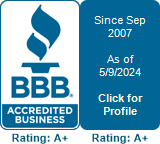5 Steps To Prepare For A Workers Compensation Audit
Have you been informed by your workers compensation carrier that they will perform a workers comp audit? The idea of an audit often strikes anxiety into the heart of any business owner or manager. But a workers comp audit is actually a fairly routine part of ensuring that your company pays the correct amount for coverage for its employees.
What can you do to prepare for your audit? And how can your accountant help? Here are five important steps to take.
1. Learn What to Expect
It's normal to be anxious about a process you don't fully understand. How can you prepare to discuss your company's policies and bookkeeping when you don't know what will be asked or what the auditor is looking for? Start by meeting with a qualified accountant to learn the basics of what to expect at the audit. They will also help you by providing tips and recommendations based on their experience.
2. Look at Prior Audits
Has your business been through any workers compensation audits in the past? If so, these are handy resources to prepare for the current audit. Past records of audits may help you see weak areas you might want to focus on during preparation. You may also note how employees were classified in prior audits and use appropriate job descriptions to maintain consistency. If any current staff participated, consult with them too.
3. Prepare Your Payroll Records
One of the biggest components of a workers comp audit is the payroll records. This audit is aimed at confirming that your employees are classified correctly and are being paid exactly as you reported to the carrier and that job positions are listed correctly. So you'll want to make sure your payroll and human resources records are accurate and complete.
Some of the most common payroll records that an auditor will look for include:
- Payroll ledger or journals
- Records of accounts payable
- Forms 1099 and Forms W-2
- State unemployment tax forms
- Employee compensation rates
- General ledger
- Overtime records
As you can see, a workers comp audit can cover extensive ground. And many small businesses' recordkeeping may not be as complete as they would like. This is why you should work with your accounting service to get everything ready accurately and on time.
4. Make Detailed Job Descriptions
A workers comp audit is somewhat unusual compared to many bookkeeping audits because it's mainly interested in what your employees actually do for the company. Workers comp rates are, in part, based on how risky each covered employee's job is. So your auditor will need to see what your employees do. Take time to create detailed job descriptions if these don't already exist. Individual workers can help with this, too.
5. Check Your Subcontractors
Did you know that independent contractors are also part of a workers comp audit? These can, in fact, impact you in two ways. First, the auditor will look for indications of anyone paid as an independent contractor (who would receive Form 1099 annually) when they should have been classified as an employee under IRS rules. Second, you may be responsible for contractors who don't carry their own workers comp.
Your accountant can help make sure none of your independent contractors have been misclassified and may be able to help you obtain things like certificates of insurance if you don't have them on file already. And they'll help you prepare to explain potential misclassifications to the auditor and prevent this from happening in the future.
Where to Start
Want to know more about preparing your business for a workers comp audit? Unsure what documents you need? Need assistance getting your books up-to-date before the audit? Start by meeting with the accounting professionals at Quality Bookkeeping Services Inc. No matter what your audit concerns, we can help. Call today to make an appointment.













